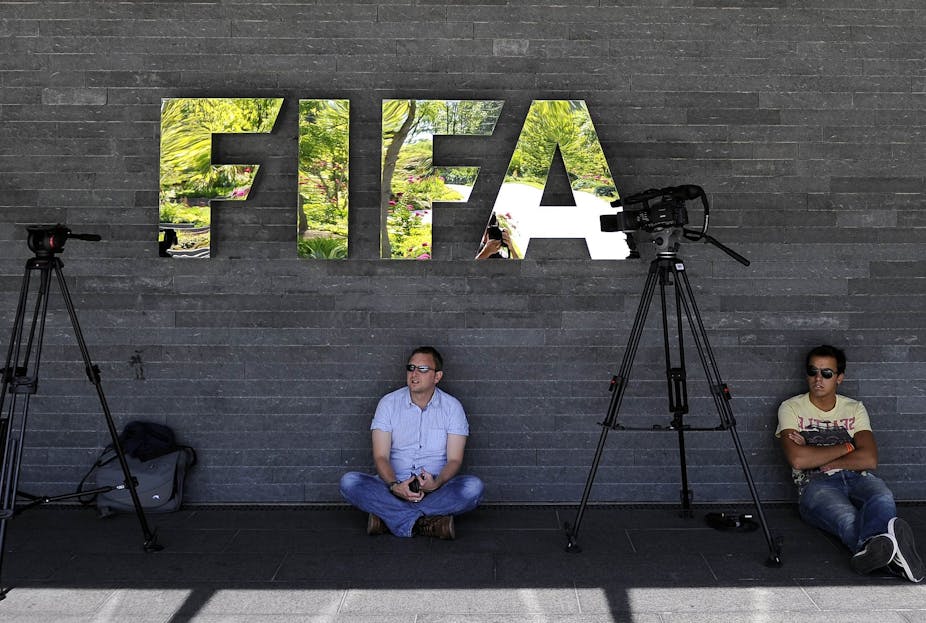In recent days, newly re-elected FIFA president Sepp Blatter has attempted to counter persistent corruption allegations by attempting to assemble a “council of wisdom” to clean up the international sporting body.
Blatter has apparently targeted former US Secretary of State Dr Henry Kissinger and more bizarrely, opera singer Placido Domingo to take part, prompting the inevitable “soap opera” headlines.
The FIFA scandal is the latest in a long list, from corruption claims at the Olympics and the Commonwealth Games to match-fixing in the Indian Premier League.
How did we get to this position? Well, it turns out that we have always been in this position: corruption in sport has been around as long as there has been organised sport. Indeed, there is evidence of an athlete bribing his opponents at the Olympics of 388 BC, 2400 years ago.
Today, most of the reaction to news of a corrupt behaviour when it happens (frequently as it seems) is to condemn the perceived offenders and to propose remedies so that it won’t happen again.
Clearly this approach is not effective in reducing its recurrence, but why?
I won’t try to solve the problem of corruption but I do want to explore what makes corruption possible. What makes groups like the IOC, FIFA, Commonwealth Games Committees and the IPL, vulnerable to corrupt practices?
To unpack corruption in sport I need to spell out the important considerations that go into it. The major factors that feature in corruption are; 1) people, 2) similarity to other fields where corruption occurs, 3) opportunities to gain money, fame, and power, 4) environments where expectations for outcomes are high (ie winning is all), 5) jobs where the prime motive is profit, and 6) situations where secrecy is standard operating practice.
How does sport stack up against these? Firstly, notice that all the main groups of people in sport have been involved in one fiasco or another: competitors, coaches, administrators, player managers, officials, referees - the lot.
Second, the kinds of corrupt practices that occur in sports are the main kinds of corrupt practices that occur in other contexts (business, politics, and the like) albeit with particular twists: fraud, bribery, fixing outcomes (match fixing through, for example, points shaving), and so on. Nothing new here, really.
Third, notice that the instances of corruption that come to the public’s notice happen in sports where there is a large amount of money (and gambling), status, or power at stake.
Fourth, the sports involved have a large supporter base; where the (usually paying) spectators outnumber the contestants.
Fifth, the sports involved have largely become seen as an entertainment or business rather than remaining the idealist picture of pure, (usually amateur) athletic endeavours.
Finally we have (as in many other contexts) claims of the need for confidentiality, secrecy, loyalty (read patriotism), business cases, and so on.
So, I have identified six categories of influencing factors to consider. How does this help in understanding how corruption could happen? Simple really, measure any situation against the criteria.
Take the current FIFA example. The allegation is that some of the voting countries were bribed by one of the candidates for their support.
From the first category there are administrators, from the second bribery, from the third money (by the bucketload), status, and power.
From the fourth there are millions of followers, from the fifth some (well, many really) commentators consider football to be either entertainment or a business, perhaps both.
Lastly international football administration operates on the quiet, relies on a network of winks and nods. Football, at the international level, has it all.
Football has it all. All the elements necessary for corrupt practices. Football is not different to the ordinary areas vulnerable to corruption. We should not expect that it will behave differently.
We should be asking not ‘Why does corruption occur in football?’ but rather ‘How is it that there are occasions when honest, ethical behaviour does occur?’
This seems an unnecessarily pessimistic note to end on. Perhaps there is something that can be done to make it right.
In short, education: to be forewarned is to be forearmed.
Ethical education so that people in situations where they are likely to be exposed to corrupt temptations can recognise the difficulties and be better able to resist them.
Expertise education so that these people can feel confident and proud to show off the work they do, so that they want to make their work transparent to all. People who are good at their job and want to do the right thing are less likely to do the wrong thing.

